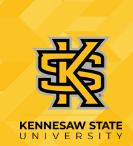Volume 2, Issue 3 (2023) Featuring Excellence in Graduate Courses
Featuring Excellence in Graduate Courses
It’s the nature of graduate programs to offer most classes online because of the population of students they serve. Graduate students are usually adults with families and/or jobs to occupy their days, so online classes – perhaps even more than night classes – meet their needs well. And it provides the opportunity for some individuals who might live too far from campus to take night classes to enroll in a graduate program.
So, it makes sense that online teaching in the graduate program has grown and improved, becoming effective and innovative in fully online and hybrid modalities. From 2017 to 2022, there has been a 35% increase in graduate students in fully online programs and a 60% increase in mixed modality programs at KSU. Of course, there was a large spike in 2020 due to the pandemic, but the percentages of graduate students in online and hybrid courses did not return down to pre-pandemic levels.
The authors published in this special edition of the Digital Course Repository were invited to submit their graduate level courses that had earned a perfect score of “100” upon initial review, thereby demonstrating their excellence in design and delivery. No matter what discipline or level you teach, I invite you to look through these courses to find wonderful ways of engaging students at high levels of thinking, delivering content, and assessing student learning outcomes.
For example, Myers’ “Advocating for Equity in Teaching and Learning,” activities focus on thinking analytically and developing a research-based plan to advocate for change in urban schools. Critical reflection is a major component of Reaves and Arias’ course, “Critical Reflections in STEM Education,” as students design, implement, and analyze a STEM unit in their own classrooms.
In “Ideation and Iteration for Creatives,” Chamberlain guides students along a journey of exploration and problem-solving. In this class, students progress from having an idea for a television show to developing a visual representation of that idea suitable to move to production and broadcast.
Students explore psychological theories and critically analyze research in Gaines’ “Psychological Foundations of Education.” They then apply their understanding to make instructional and classroom management decisions and inform design.
Ali Keyvanfar and Robert Keyser have had courses featured in the DCR and/or have presented at the My Digital Experience: A Show and Tell Conference, so of course you will find great ideas in their courses published here.
It doesn’t take much to see how the design, support, instructional strategies, assessments, and engagement opportunities of these courses are effective in the disciplines represented and are applicable to similar activities in courses in other disciplines. So take a look!
After reviewing the abstracts, if you wish to have access to the D2L course shell, please send an email with your request to me at dcrlibrarian@kennesaw.edu.
Watch for a special issue in the fall featuring excellent undergraduate courses!
Course Designs
Critical Reflections in STEM Education
Jessica R. Stephenson Reaves and Anna Maria Arias
Advocating for Equity in Teaching and Learning
Marrielle Myers
Construction Risk Analysis and Control
Ali Keyvanfar
Human Factors Engineering
Robert S. Keyser
Psychological Foundations of Education
Rachel E. Gaines
Ideation and Iteration for Creatives
Sandee M. Chamberlain

